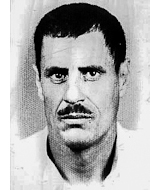Son of is sure and crummy. Hamidi was born in 1936 in the Heib tribe, which is located in Tuba-Zangaria in the Galilee. He grew up and was educated in his village, and in his youth he spent a lot of time in the countryside, dealing mainly with herding, farming and building. As a teenager, the family moved to the village of Mughar, where Hamidi married his beloved Hamada and established his family. He had twelve children: Lutfi, Zidan, Zaid, Mahmud, Zaida, Sabha, Nashed, Nasser, Khat, Amira, Turkiya and Farad. Hamidi followed his brothers who served in the army for many years, and on December 25, 1967 he enlisted in the Border Police to serve as a tracker. During the War of Attrition, he served in the Beit She’an area, which was then very hard and hostile, with lots of penetrations and mines, and always participated in the pursuit. Hamidi’s commanders appreciated him very much as an excellent tracker, who participates in almost every event, with special qualities that make everyone satisfied with him. He often risked his life to save others. Hamidi’s friends also loved him very much and knew that they could always get help. He liked helping others and had a wonderful sense of humor. He received all the hassles of life easily and in his mouth was the sentence: “Tomorrow there is another day.” In 1978, when Hamidi was on a night patrol on the system road, a bazooka fire and machine guns were fired at the patrol, but the patrol members succeeded in silencing the source of the shooting. The team was awarded a financial reward for its performance in the incident. In 1983, Hamidi was awarded the Israel Police Service Medal, which stated: “He made an extraordinary contribution to achieving a police target, while showing perseverance and adherence to the goal.” In 1983 Hamidi was transferred to Lebanon to serve in Lebanon, although he could have asked for closer service because of his age. He was supposed to pass on November 5, 1983 to a rear unit at the Netofa station, but the day before he was killed. First Sergeant Hamidi fell in the second Tire disaster. During the Peace for Galilee War, while the IDF was operating against the PLO and Hizbullah organizations in Lebanon, the Border Police acted in collaboration with the Shin Bet to liquidate the nests of terrorists in the city of Tire. The fighters were housed in a facility that had two two-story buildings. On Friday, November 4, 1983, at 6:00 am, a pickup truck drove from the Rosh Hanikra-Zur road to the facility, which was surrounded by a dirt embankment and a perimeter fence and was secured with constant protection. The pickup truck drove the gunner’s suspicion and opened fire. Another guard who noticed the incident also opened fire at the suspect. Despite the fire, the truck broke through the entrance gate to the facility and entered between the two buildings. The suicide bomber detonated the 500 kilograms of explosives in the car and caused the buildings to collapse. Sixty people were killed, including twenty-eight members of the security establishment. Hamidi was forty-seven when he fell. He was brought to eternal rest at a military ceremony at the Bedouin cemetery of Majar-Marar. He left behind a wife and twelve children. His young daughter was born a few hours before his fall, he did not see her and did not know she was born. The daughter was called Prad, which meant Frida. “In November 1982, Hamidi served in Company K, many of whose fighters were killed in the collapse of the military government building in Tire, and it took us a long time to get used to the fact that the place of Chief Rabbi Hamidi was absent from us and we will no longer see him in the landscape of The company. Was an outstanding tracker. He often identified traces of terrorists infiltrating the country, thus preventing serious disasters. “All of Hamidi’s children continued their studies, as he wanted, and some of them continued his career and served in the Border Police as detectives.
